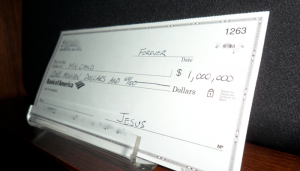Recently, the word ‘daily’ has been standing out for me. It seems so easy to do this Christian life thing in chunks and spurts but more difficult to allow God to set the rhythm of my life. It’s difficult to stay efficient and contemplative at the same time. Life-styles demand efficiency. My soul desperately needs contemplation. Since I choose not to live as a monk, cut off from the world (however tempting that may be at times), I need a way to ground myself. I don’t want my faith to mean something only on Sunday morning. Anyone else feel this way?
The Bible speaks often of things that occur daily. In Exodus 16:4, God tells Moses that He will provide daily bread (manna) for His people “that I may test them, whether or not they will walk in My instruction.” In other words, God doesn’t give them storehouses. He promises to provide for their needs daily so long as they trust Him.
This manna was a rehearsal for God’s people. When Jesus taught His disciples to pray, He told them to ask for their daily bread. Then He said something amazing: He is the bread of life. In the same way the Israelites could not make it without their daily manna, we cannot make it without our Daily Bread, Jesus.
So how do we do this? The Christians in Berea read the Scriptures…daily. Paul announced, in 1 Corinthians 15:31, that he died…daily. We need rhythms, habits if you will, that keep us in a daily dependence on God. The way we think about brushing our teeth daily, we need activities that connect us with God’s Spirit in us…daily. We can, then, be efficient and contemplative. Practicing daily prayer times or reading reflectively through a passage of Scripture on a daily basis can be a starting place. Our early church fathers called these practices “Spiritual Disciplines.” These are not the “you-are-in-so-much-trouble” kind of disciplines. These are the “so-you-want-to-finish-the-race” kind of disciplines. We need practices that facilitate a constant connection with God. We need God daily.
The flip side is that the Lord “daily bears our burden” (Psalm 68:19). And we have a Savior, Jesus, who can translate all those daily moments into eternity. Hebrews 7:26-27 tells us that, because of His perfection, Jesus did not need to make daily sacrifices. Instead, He was able to offer Himself up “once for all” and cover our sins. Somehow, God can take those daily moments that we offer Him and translate them into eternal significance. Instead of trying to daily “make it up to God” we are asked, instead, to daily connect with the Vine and allow His actions to “make it up” for us.
Give us this day our daily bread.
Amen






